DW represents Europe at Tepal
Representatives from DW’s America distribution are currently on hand at one of Latin America’s premier media expositions. The Tepal Expo, being held for the first time in Panama, features presentations from big names in international media including HBO Latin America, Discovery Latin America and CNN Español.
Next to DW on the exposition floor are Latin American networks including the Argentinian Telefe, TuVes from Chile or TV Azteca from Mexico. Heavy hitters in Latin American distribution like Viacom, Cablevisión, Megacable and the Panamanian cable provider Cable Onda are also a few of the interesting and potential future DW partners who are at the event. You’ll find a complete list here.
DW will be presenting the Spanish language production, Vision Futuro, at the Tepal Expo with a special focus on renewable wind energy, which is a very important issue for the development of Latin American infrastructure. DW has been steadily increasing its presence in Latin American markets, offering a full 24 hours of Spanish langauge programming every day. DW is also the only European international broadcaster represented at Tepal 2014.
DW opens the door for Indian television in Europe
A new deal between DW and the Indian public service broadcaster, Doordarshan (DD), is a groundbreaking step towards bringing Indian television to Europe. For the first time in its 55 years of operation, DD will be available via a free-to-air DTH service outside of India. The deal opens the door to a symbiotic distribution model with which DD India, DD’s international channel, will be broadcast in Europe using DW’s satellite capacity and in exchange, DW will be broadcast using the satellite capacity of DD Freedish in India.
The exchange of capacities is good for both sides and a positive development in a market where using partners is essential to success. Other international broadcasters like France 24 have also recently signed distribution contracts using DD broadcasting facilities, but unlike with DW, it was a one way deal with no provision for rebroadcasting DD content in return.
Since its launch in 1995, DD India has made many attempts at broadcasting to international audiences and even paid to uplink the channel to satellites. But the lack of any downlink agreements continually kept the channel from being broadcast. DD India’s mission is to “build bridges of communication to Indians living abroad and showcase the real India.” The deal with DW will give DD India the potential to reach 120 million homes abroad. DW will reach a potential 25.5 million homes in India via DD Freedish.
The deal was announced in a joint press conference in New Delhi attended by DW representatives, officials from the German embassy, and the CEO of Prasar Bharati, which operates DD. DD India plans to start broadcasting internationally via the Hotbird 13b satellite in October.
Let’s get high-quality information to low-tech devices in Africa
Annelie Moreira Da Silva, DW Distribution Representative for Africa
Smartphones are fast becoming the standard tool for consuming news and information, but for many people in developing and emerging countries, this technology is still out of reach. It is estimated that out of the total 5 billion mobile users worldwide, only 1 billion are using smartphones. The remaining number represents a majority of people in emerging and developing countries who are using 2G or “feature phones” for mobile Internet access.
DW works hard to provide top-quality news and information to people in hard to reach places. In emerging markets such as in Africa, expensive Internet and mobile technology makes smartphones a luxury that few can afford. Most people try to use their feature phones to access valuable social networks and online news which usually demands a higher level of data processing than these devices can provide – but there are some solutions.
A innovative platform called biNu is providing a way for feature phones to efficiently navigate the web. And since June, DW has been cooperating with biNu to provide feature phone users in Africa with easy access to DW’s high-quality online news content.
The biNu app provides high-end functionality by turning feature phones with a basic Internet connection into “virtual smartphones.” It achieves this by using cloud networks to process and compress data from websites allowing the end result to be easily used via a feature phone. The result of using a cloud platform to streamline data is a service that is 10 times faster than a standard mobile browser while requiring 10 times less bandwidth. The displays are simplified and optimized for a feature phone and the most important elements of the website are passed on to the user.
The service already has more than 900,000 users in Africa, mostly located in fast-growing media markets like Nigeria, Kenya, South Africa and Ghana but also in countries like Zimbabwe and Ethiopia where, because of the difficult political climate, are harder for international media to access.
Even as infrastructure improves, the low cost of feature phones and continually expensive network and Internet access means that many people in these developing countries will continue to use their mobile phones as the primary device for going online. Providing them with easily accessible news, information and social networks is a hugely important task. Through cooperating with biNu, DW can overcome the disparity in international technological standards and provide information that people need on the device that they prefer.
Market roundup: August 2014
Latin America
DW presented the winners of a multimedia journalism competition with their prizes in Colombia at an awards ceremony held at DW’s Colombian partner station, Señal Colombia, in Bogotá. The contest received a lot of attention from Colombian media and the awards ceremony was attended by many prominent journalists and media producers. Two grand prize winners received a trip to Bonn for the Global Media Forum and four others also received prizes. Around 60 participants competed in the contest which was centered on environmental and ecological issues. The contest ran from the end of last year to April and was divided into video and print categories.
Asia
DW has a new web TV partner in India. Zenga TV, one of India’s leading portals for TV live streams will now carry the English-language channel, DW. The channel is also available via Zenga on mobile devices. The service currently has 21 million registered subscribers.
Indonesia’s largest pay-TV platform, Indovision, is now including DW in its expanded IPTV service, Playmedia. The provider expects to draw 1.5 million new subscribers with the service.
The Taiwanese cable provider Digidom will now carry the English-language channel, DW. The provider delivers local and international TV channels to Taipei.
New Outernet partnership puts focus on free Internet
DW recently developed a content partnership with Outernet. Outernet shares many of the same values as DW, including the belief that access to knowledge and information is a human right. Outernet’s plan is to guarantee this right by taking a practical approach to information delivery. Their plan is to use a fleet of approximately 200 satellites to create a satellite-supported WiFi network to provide individuals with access to information. Through satellite data broadcasting, Outernet is able to bypass censorship, ensure privacy and offer a universally-accessible information service at no cost to users. It’s the modern version of shortwave radio, or BitTorrent from space.
DW’s Oliver Linow contirbuted to the Outernet blog in which he stated:
“It is more important than ever to deliver uncensored information to those who don’t enjoy the freedom of opinion and freedom of the press at home. Outernet strives to provide this open access to everyone around the world. We share those values. As a partner, we will accompany Outernet over the next few months and provide them with practical support in their test phase. This undertaking by Outernet could represent one of several ways to combat limited net neutrality and Internet censorship – for example in Africa and parts of Asia. Only time will tell, if this will be successful, but we are happy to collaborate along the way in this grand experiment in global information equality.”











Feedback